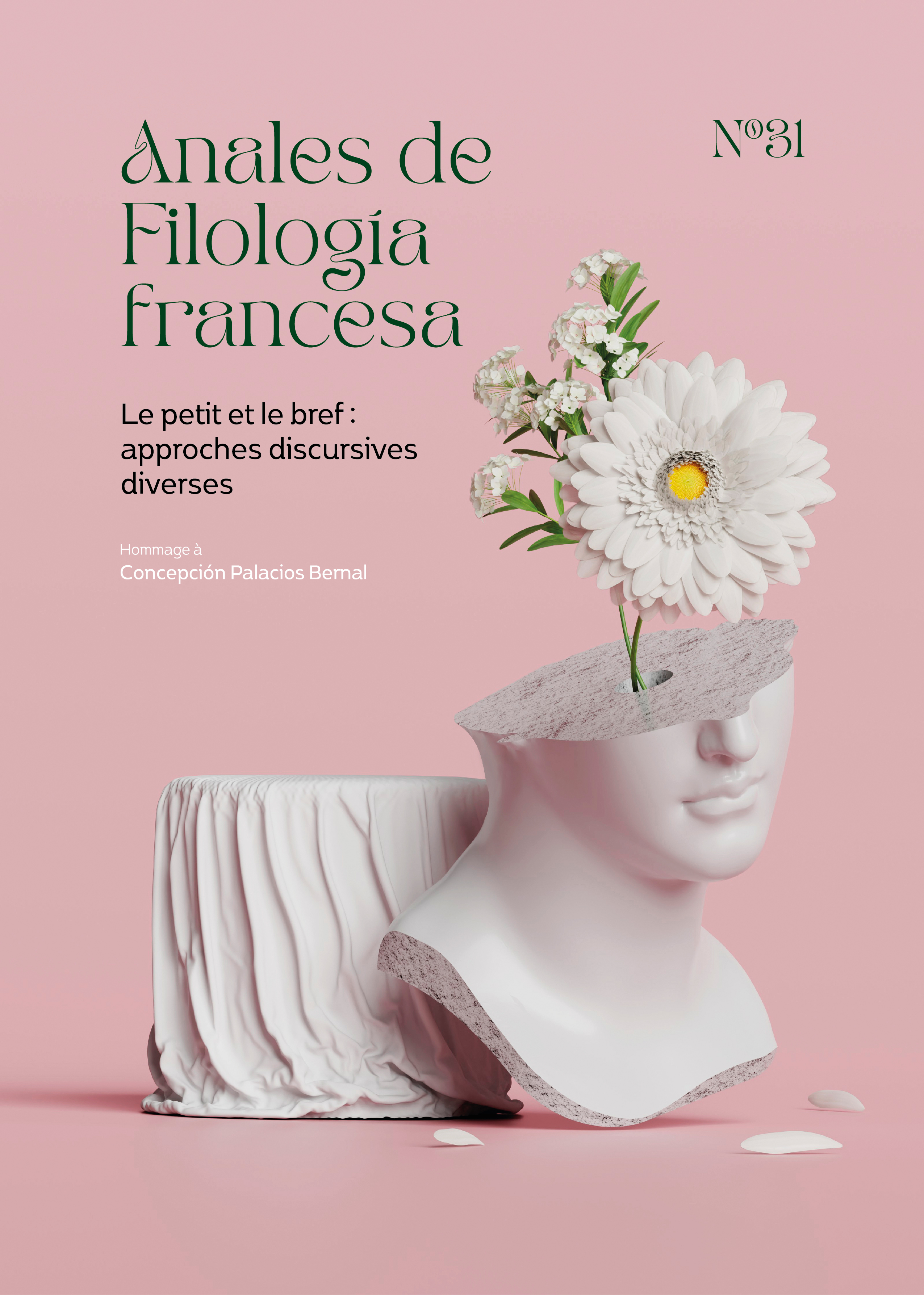Elles disent by Léonora Miano: a melopoeia of quotes or how to create something small with something brief
Abstract
In her book Elles disent (2021) Léonora Miano builds a brief fifty-page “piece vocal” using quotes borrowed from women from all the continents and “professions”. The quote, which is the most canonical form of intertextuality, involves a previous task of reading and cutting that, in this work, reveals the female literary and musical heritage of the author and it also has several functions, which are described by Maingueneau. However, since Miano disappears from her text, she diverts the quotes and thus refutes the notions of auctoritas and truth. Her work of assemblage and “transplant”, inspired by jazz and negro spiritual, allows her to create a feminine melopoeia that polyphonically takes up recurring themes in her works and questions Western knowledge. For Miano, all writing is political and this decolonial exquisite corpse of citations - marked by the hybridity which it claims - is no exception to the norm. With these brief texts, she creates an original small monster-essay through which she tries to create another language for women.
Downloads
-
Abstract340
-
PDF (Français )487
References
ACHILLE, Louis T. 1956. “Les Negro-spirituals et l'expansion de la culture noire” in Présence Africaine, Nouvelle série, nº 8/10, 227-237.
BEHAR, Henri. 1988. Littéruptures. Paris, Les Éditions l’Âge d’Homme.
CHARAUDEAU, Patrick. 1992. Grammaire du sens et de l’expression. Paris, Hachette.
COMPAGNON, Antoine. 1979. La seconde main ou le travail de la citation. Paris, Seuil.
DERRIDA, Jacques. 1972. La Dissémination. Paris, Seuil Points-essais.
DERRIDA, Jacques. 1990. Spuren in Kunst und Gesellschaft, octobre-décembre. Hambourg. https://redaprenderycambiar.com.ar/derrida/frances/passages.htm
FAHMIN, Mustapha. 2008. “ ‘Je ne sais de quel nom m’appeler’: Shakespeare, Montaigne et la question identitaire” in Cahiers Charles V, n°45. Shakespeare, les français, les France, 51-65.
GENETTE, Gérard. 1982. Palimpsestes. Paris, Seuil.
GLAUDES, Pierre & Jean-François LOUETTE. 2011. L'essai. Paris, Armand Colin, Hors collection.
KRISTEVA, Julia. 1969. Séméotiké, Recherches pour une sémanalyse, Paris, Seuil.
KUSNIERZ, Mathias. 2006. “Lautréamont et l’hybridation générique dans Les Chants de Maldoror : dévorations, aberrations et tératologies », in Loxias, nº14. http://revel.unice.fr/loxias/index.html?id=1202.
MAINGUENEAU, Dominique. 1991. L’Analyse du discours. Introduction aux lectures de l’archive. Paris, Hachette.
MAINGUENEAU, Dominique. 1976. Initiation aux méthodes de l’analyse du discours. Paris, Hachette.
MARTIN, Denis-Constant. 2002. “Le char de l’espérance. Humanisation et conscience de soi dans un spiritual afro-américain” in L’Homme, 161/janvier-février, 111-122.
MIANO, Léonora. 2012a. Habiter la frontière. Paris, L’Arche.
MIANO, Léonora. 2012b. Écrits pour la parole. Paris, L’Arche.
MIANO, Léonora. 2016. L’Impératif transgressif. Paris, L’Arche.
MIANO, Léonora. 2019. Ce qu’il faut dire. Paris, L’Arche.
MIANO, Léonora. 2020. Afropea. Utopie post-occidentale et post-raciste. Paris, Grasset.
MIANO, Léonora. 2021a. Elles disent. Paris, Grasset.
MIANO, Léonora. 2021b. L’Autre langue des femmes. Paris, Grasset.
NSONSISSA, Auguste. 2013. “Le principe d’interlocution dialogique d’Edgar Morin et son application à la logique d’oralité dans les traditions africaines” in Sociétés, 2013/3, nº 121, 65-74
PIEGAY GROS, Nathalie. 1996. Introduction à l’intertextualité. Paris. Dunod.
POPELARD, Dominique & Anthony WALL (sous la direction de). 2005. Citer l'autre. Paris, Presses Sorbonne nouvelle.
SARRAUTE, Nathalie. 2009 [1956]. L’Ère du soupçon. Paris, Folio essais.
Las obras que se publican en esta revista están sujetas a los siguientes términos:
1. El Servicio de Publicaciones de la Universidad de Murcia (la editorial) conserva los derechos patrimoniales (copyright) de las obras publicadas, y favorece y permite la reutilización de las mismas bajo la licencia de uso indicada en el punto 2.
2. Las obras se publican en la edición electrónica de la revista bajo una licencia Creative Commons Reconocimiento-NoComercial-SinObraDerivada 3.0 España (texto legal). Se pueden copiar, usar, difundir, transmitir y exponer públicamente, siempre que: i) se cite la autoría y la fuente original de su publicación (revista, editorial y URL de la obra); ii) no se usen para fines comerciales; iii) se mencione la existencia y especificaciones de esta licencia de uso.
3. Condiciones de auto-archivo. Se permite y se anima a los autores a difundir electrónicamente las versiones pre-print (versión antes de ser evaluada) y/o post-print (versión evaluada y aceptada para su publicación) de sus obras antes de su publicación, ya que favorece su circulación y difusión más temprana y con ello un posible aumento en su citación y alcance entre la comunidad académica. Color RoMEO: verde.










